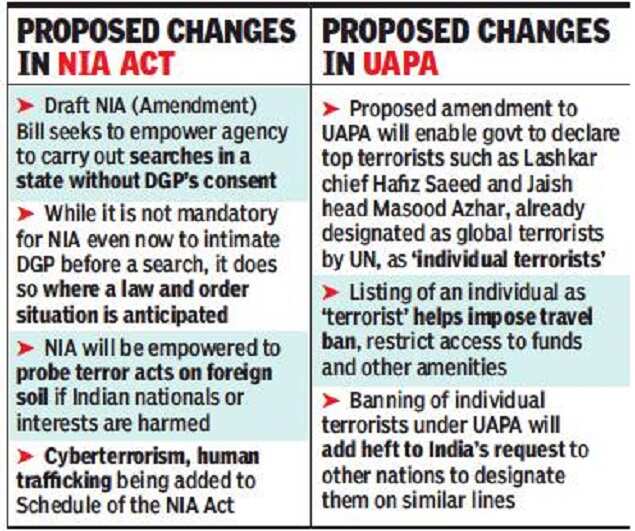Union Cabinet Moves To Strengthen Anti-Terrorism Law, Agency

The Cabinet also approved a proposal to amend the NIA Act to empower the agency to register a case and investigate terror acts on foreign soil. The draft National Investigation Agency (Amendment) Bill seeks to widen the scope of cases the agency can investigate
NEW DELHI: An amendment to the Unlawful Activities (Prevention) Act cleared by the Cabinet on Monday will allow individual terrorists to be included in the schedule of “banned” entities. The Cabinet also approved a proposal to amend the NIA Act to empower the agency to register a case and investigate terror acts on foreign soil if Indian nationals or interests are harmed.
The draft National Investigation Agency (Amendment) Bill seeks to widen the scope of cases the agency can investigate. New offences being added to the schedule of NIA Act include cyber-terrorism cases registered under Section 66F of the Information Technology Act, 2000 as well as IPC crimes under Sections 370 and 371 relating to human trafficking that often have inter-state and international linkages.

The amendments to UAPA and the NIA Act will be put up for approval in Parliament in the current session. The draft NIA (Amendment) Bill also seeks to permit searches in a state without the top state police official’s consent. While it is not mandatory for the NIA even now to intimate a director general of police before a search, the agency does so where a law-and-order situation is anticipated.
The proposed amendment to UAPA will enable the government to declare top terrorists, such as Lashkar-e-Taiba chief Hafiz Saeed and Jaish-e-Mohammed boss Masood Azhar, as “individual terrorists”.
Another amendment proposed is allowing a judge of an NIA court to be designated by position and not by name. The listing of an individual as a “terrorist” helps impose a travel ban and restrict such a person’s access to funds and other amenities. The standards of the Financial Action Task Force require member nations to be in line with the United Nations’ law that provides for designating individuals as global terrorists.
Apart from publicising most-wanted terrorists so as to get all financial and other institutions to add them to their blacklists, banning of individual terrorists under the Unlawful Activities (Prevention) Act (UAPA) will add heft to India’s request to other nations to designate them along similar lines.
The proposed amendment to empower the National Investigation Agency to register a case in India and probe acts of terrorism abroad, such as the Easter Sunday suicide bombings in Sri Lanka that left 11 Indians dead, are meant to add an enabling provision in the law, even though any such investigation on foreign soil will have to be with the cooperation and coordination of the host nation.
The amendments to UAPA and the NIA Act will be put up for approval in Parliament in the current session. The draft NIA (Amendment) Bill also seeks to permit searches in a state without the top state police official’s consent. While it is not mandatory for the NIA even now to intimate a director general of police before a search, the agency does so where a law-and-order situation is anticipated.
The proposed amendment to UAPA will enable the government to declare top terrorists, such as Lashkar-e-Taiba chief Hafiz Saeed and Jaish-e-Mohammed boss Masood Azhar, as “individual terrorists”.
Another amendment proposed is allowing a judge of an NIA court to be designated by position and not by name. The listing of an individual as a “terrorist” helps impose a travel ban and restrict such a person’s access to funds and other amenities. The standards of the Financial Action Task Force require member nations to be in line with the United Nations’ law that provides for designating individuals as global terrorists.
Apart from publicising most-wanted terrorists so as to get all financial and other institutions to add them to their blacklists, banning of individual terrorists under the Unlawful Activities (Prevention) Act (UAPA) will add heft to India’s request to other nations to designate them along similar lines.
The proposed amendment to empower the National Investigation Agency to register a case in India and probe acts of terrorism abroad, such as the Easter Sunday suicide bombings in Sri Lanka that left 11 Indians dead, are meant to add an enabling provision in the law, even though any such investigation on foreign soil will have to be with the cooperation and coordination of the host nation.



No comments:
Post a Comment